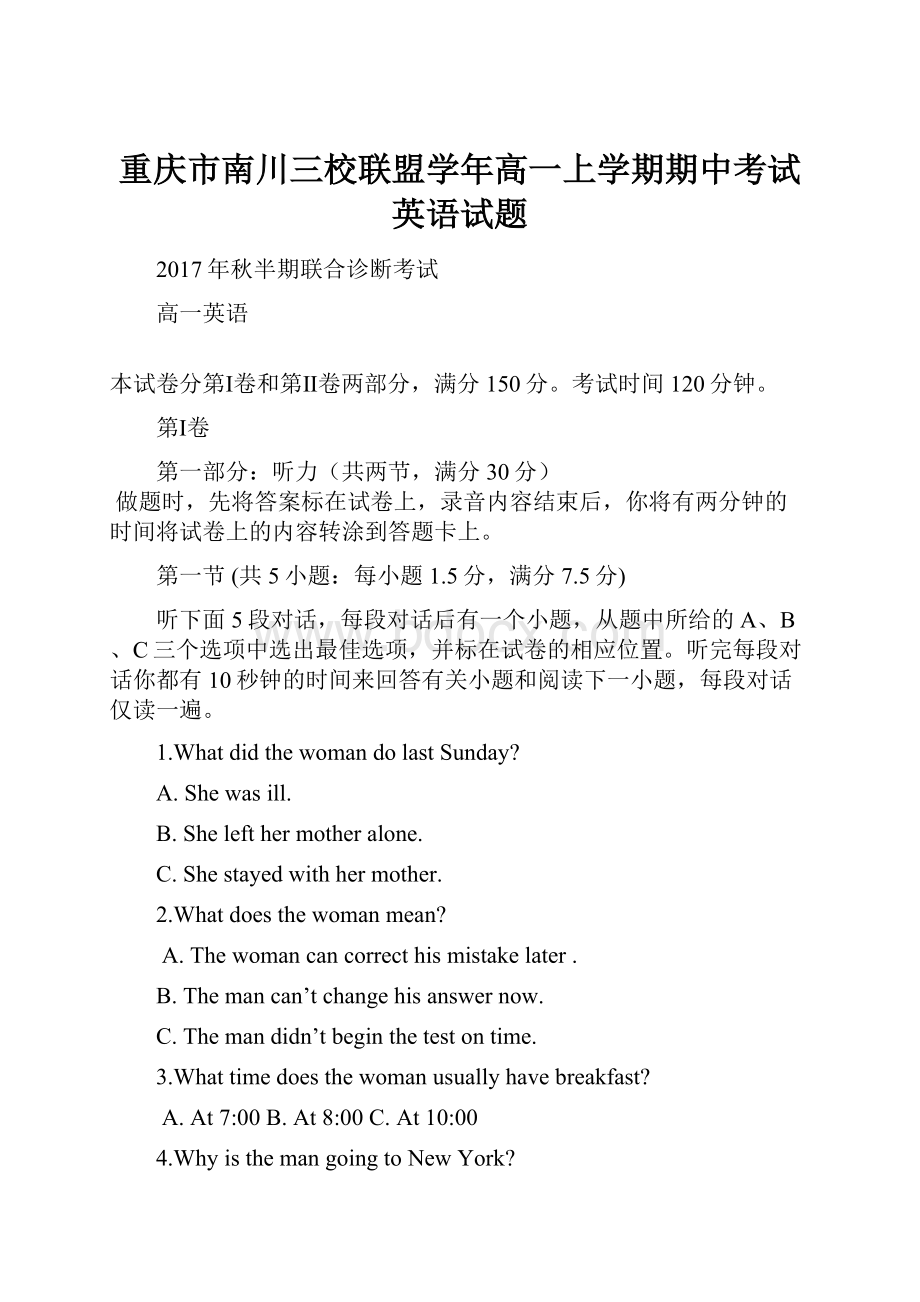重庆市南川三校联盟学年高一上学期期中考试英语试题.docx
《重庆市南川三校联盟学年高一上学期期中考试英语试题.docx》由会员分享,可在线阅读,更多相关《重庆市南川三校联盟学年高一上学期期中考试英语试题.docx(14页珍藏版)》请在冰豆网上搜索。

重庆市南川三校联盟学年高一上学期期中考试英语试题
2017年秋半期联合诊断考试
高一英语
本试卷分第Ⅰ卷和第Ⅱ卷两部分,满分150分。
考试时间120分钟。
第Ⅰ卷
第一部分:
听力(共两节,满分30分)
做题时,先将答案标在试卷上,录音内容结束后,你将有两分钟的时间将试卷上的内容转涂到答题卡上。
第一节(共5小题:
每小题1.5分,满分7.5分)
听下面5段对话,每段对话后有一个小题,从题中所给的A、B、C三个选项中选出最佳选项,并标在试卷的相应位置。
听完每段对话你都有10秒钟的时间来回答有关小题和阅读下一小题,每段对话仅读一遍。
1.WhatdidthewomandolastSunday?
A.Shewasill.
B.Shelefthermotheralone.
C.Shestayedwithhermother.
2.Whatdoesthewomanmean?
A.Thewomancancorrecthismistakelater.
B.Themancan’tchangehisanswernow.
C.Themandidn’tbeginthetestontime.
3.Whattimedoesthewomanusuallyhavebreakfast?
A.At7:
00B.At8:
00C.At10:
00
4.WhyisthemangoingtoNewYork?
A.Toworkthere
B.Tovisitafriend
C.Tohaveavacation
5.Whatdoesthemanprefer?
A.TeaB.CoffeeC.Coldwater
第2节(共15小题;每小题1.5分,满分22.5分)
听下面5段对话或独白。
每段对话或独白后有几个小题,从题中所给的A、B、C三个选项中选出最佳选项,并标在试卷的相应位置。
听每段对话或独白前,你将有5秒钟的时间阅读各个小题;听完后,各小题将给出5秒钟的作答时间。
每段对话或独白读两遍。
听第6段材料,回答6、7题。
6.What’sthemeetingabout?
A.AbouthelpingBob.
B.Aboutabirthdayparty.
C.Abouthelpingthewoman’smother.
7.Whydoesthewomanhavetogohome?
A.Becauseshehadtodoherhomework.
B.Becauseshehadtolookafterhersickmother.
C.BecauseshehastolookafterherbrotherBob.
听第7段材料,回答8、9题。
8.Whatisthewomangoingtodo?
A.GocyclingB.WalkintheparkC.Studyinthelibrary
9.Whydoesthemanliketostudyindifferentplaces?
A.They’reusuallyquiet.
B.They’reinterestingplaces
C.Ithelpsgivehimnewideas.
听第8段材料,回答第10至12题。
10.Whatkindofgamewasit?
A.Itwasabasketballgame.
B.Itwasafootballgame.
C.Itwasabaseballgame.
11.Whoranthefastest?
A.CarlB.GaryC.Steven.
12.Whatdoweknowabouttheman?
A.Heisnotagoodplayer.
B.Hewatchedthewholegame.
C.Hislegwashurtinthegame.
听第9段材料,回答第13至16题。
13.Whatcoloristhedog?
A.WhiteB.BlackC.Blackandwhite
14.Wheredoestheconversationtakeplace?
A.InthemountainB.BythelakesideC.Onthehighway
15.Howisthewomanfeelingnow?
A.worriedB.AshamedC.Disappointed
16.Whatcanwelearnfromtheconversation?
A.Themaniswarm-hearted
B.Thedogisstolenbysomeone
C.Thedogdoesn’tknowtheway
听第10段材料,回答第17至20题。
17.Whereisthespeakerfrom?
A.AmericaB.AustraliaC.England
18.Whydoesthespeakerlikesinging?
A.Itmakesherclever
B.Itmakesherrelaxed
C.Itgivesherachancetoshowherself
19.Howlongdoesthespeakerusuallyspendonmatheveryday?
A.OnehourB.TwohoursC.Fourhours
20.Whatkindofpersonisthespeaker?
A.QuietB.NervousC.Outgoing
第二部分阅读理解(共两节,满分30分)
第一节(共10小题;每小题2分,满分20分)
阅读下列短文,从每题所给的四个选项(A、B、C和D)中,选出最佳选项,并在答题卡上将该项涂黑。
A
Manyteenagers(青少年)feelthatthemostimportantpeopleintheirlivesaretheirfriends.Theybelievethattheirfamilymembers,especiallytheirparents,don’tknowthemaswelltheirfriendsdo.Inlargefamilies,itisoftenforbrothersandsisterstofightwitheachotherandthentheycanonlygototheirfriendsforadvice.Itisveryimportantforteenagerstohaveonegoodfriendormanyfriends.Evenwhentheyarenotwiththeirfriends,theyusuallyspendalotoftimetalkingaboutthemselvesonthephone.Thiscommunicationisveryimportantinchildren’sgrowingup,becausefriendscandiscusssomething.Thesethingsaredifficulttosaytotheirfamilymembers.
However,parentsoftentrytochoosetheirchildren’sfriendsforthem.Someparentsmayevenstoptheirchildrenfrommeetingtheirgoodfriends.Thequestionof“choice”isaninterestingone.Haveyoueverthoughtofthefollowingquestions?
Whochooseyourfriends?
Doyouchooseyourfriendsoryourfriendschooseyou?
Haveyougotagoodfriendsyourparentdon’tlike?
21.Manyteenagersthinktheir____knowthembetterthantheirparentsdo.
A.friends
B.brothersandsisters
C.familymembers
D.mothers
22.Whenteenagersstayalone,theusualwayofcommunicationisto_________.
A.discusswithbrothersandsisters
B.talkwiththeirparents
C.haveadiscussionwiththeirfamily
D.talkwiththeirfriendsonthephone.
23.Whatthemainideaofthispassage?
A.Teenagersneedfriends.
B.Friendsoftengivegoodadvice.
C.Parentsoftenchoosetheirchildren’sfriendsforthem.
D.Goodfriendscancommunicatewitheachother .
B
AstudentislearningtospeakBritishEnglish.Hewonders(想知道):
CanIcommunicatewithAmericans?
Cantheyunderstandme?
LearnersofEnglishoftenask:
WhatarethedifferencesbetweenBritishandAmericanEnglish?
Howimportantarethesedifferences?
Certainly!
TherearesomedifferencesbetweenBritishandAmericanEnglish.‘Thereareafewdifferencesingrammar.Forexample,speakersofBritishEnglishsay“inhospital”and“Haveyouapen?
”.Americanssay“inthehospital!
”and“Doyouhaveapen?
”.Pronunciationissometimesdifferent.Americansusuallysoundtheirsinwordslike“bird”and“hurt”.SpeakersofBritishEnglishdonotsoundtheirsinthesewords.TherearedifferencesbetweenBritishandAmericanEnglishinspellingandvocabulary.Forexample,“colour”and“honour”areBritish,“color”andhonor”areAmerican.
Thesedifferencesingrammar,pronunciation,spellingandvocabularyarenotimportant,however.Forthemostpart,BritishandAmericanEnglisharethesamelanguage.
24.Accordingtothispassage,astudentwhoislearningtospeakAmericanEnglishmightbeafraidthat_______.
A.Britishpeoplecannotunderstandhim
B.Americanpeoplecannotunderstandhim
C.thegrammaristoohardforhim
D.thespellingistoohardforhim
25.AmericanEnglishandBritishEnglisharedifferentin________.
A.spelling
B.pronunciation
C.grammar
D.alloftheabove(以上全是)
26.Accordingtothispassage,BritishpeopleandAmericanshave_________difficultyinunderstandingeachother.
A.little
B.much
C.some
D.great
C
Onedayateacherwasgivingheryoungstudentsalessononhowthegovernmentworks.Shewastryingtoexplaintheprincipleofincometax(收入税).
“Yousee,”shebegan,speakingslowlyandcarefully,“eachpersonwhoworksmustpaypartofhisorhersalary(薪水)tothegovernment.Ifyoumakeahighsalary,yourtaxesarehigh.Ifyoudon’tmakemuchmoney,yourtaxesarelow.”
“Isthatclear?
”sheasked.“Doeseveryoneunderstandthemeaningofincometax?
”Thestudentsnodded.
Arethereanyquestions?
”sheasked.Thestudentsshooktheirheads.
“Verygood!
”shesaid.”“Now,Iwouldlikeyoutotakeapieceofpaperandwriteashortpassageonthesubjectofincometax.
LittleJoeywasaslowlearner.Hehadlotsofproblemswithspellingandgrammar,butthistimeheatleastseemedtounderstandthetask.Hetookhispenandafterafewminutes,hehandedtheteacherthefollowingcomposition:
OnceIhadadog.HisnamewasTax.
IopenedthedoorandincomeTax.
27.Theteacherwastryingtoexplain_____someday.
A.theprinciplesoftheincometax
B.howthegovernmentworks
C.everyoneshouldpayincometax
D.howmuchtaxoneshouldpayforhisincome
28.Aftertheteacher’sexplanation, ______ .
A.allthestudentsshooktheirheads
B.manyofthestudentswerestillpuzzled
C.notallthestudentsunderstoodthemeaningofincometax
D.afewstudentsdisagreedwiththeirteacher
29.Whatwerethestudentsaskedtodo?
.
A.tosaysomethingaboutincometax
B.toanswersomequestionsonincometax
C.towriteacompositiononincometax
D.toexplaintheprincipleofincometax
30.Whichofthefollowingsentenceistrue?
A.LittleJoeywasclever
B.LittleJoeyknewwhattheteachersaid
C.LittleJoeywasnotcleverenough
D.LittleJoeydidwhathewastoldtodo
第2节(共5小题,每题2分,共10分)
根据短文内容,从短文后的选项中选出能填人空白处的最佳选项,并在答题卡上将该项涂黑。
选项中有两项为多余选项。
Asweknow,everyonecanmakemistakes,butdon’tworryaboutit.Thefollowing
iswhatweshoulddowhenwemakemistakes.
•Justadmit(承认)it.Don’tthinkthatourmistakesarecausedbyothers. 31
Don’tblameotherpeople,anddon’tcheatourselves,either.
• 32 Inordertostoptheproblemfromgettingworse,weshouldactquicklyto
solveit.Ifwedon’tactanddealwiththeproblemquickly,it’llonlymakeus
feelmorestressed.Alsoitisnecessarytomakeaplanofactionandcorrectthe
mistakeaccordingtoit. 33
• 34 ThosewhohavemadethemostmistakescangetanA,fortheyarethe ones
whohavelearnedthemost.Themorewelearnfromourmistakes,theclevererweare.
• 35 Whatcausedustomakethemistake?
Howcanweavoidmakingthesamemistake
inthefuture?
Whenweactwithamethodtogetagoodresult,doitthatwaynext
time.Ifwedon’t,weshouldstop,thinkaboutit,changeitandtryagain.
A.Realizethatmakingmistakesisthebestwaytolearn.
B.Don’tbeafraidoffailure.
C.Bebraveandfacethefactthatwehavemadethemistakes.
D.Solveitatonce.
E.Sobeawayfromstress.
F.Sodecidequicklyandact.
G.Thinkaboutwhatwecanlearnfromourmistakes.
第3部分:
英语知识运用
第一节:
完形填空(共20小题;每小题1.5分,满分30分)
阅读下面短文,掌握其大意,然后从36—45各题所给的四个选项(A、B、C和D)中,选出最佳选项。
TherewasawomaninDetroit,whohastwosons.Shewasworried 36 them,especiallytheyoungerone,Ben,37hewasnotdoingwellinschool.Boysin his class 38 funof him becauseheseemedso39.
Themother40thatshewouldhavetogethersonstodobetterinschool.She 41 themtogototheDetroitPublicLibrarytoreada 42aweekanddoareportaboutitforher.
Oneday,inBen’s 43,theteacherhelduparock(石头)andaskedifanyoneknewit.Ben44 uphishandandtheteacherlethim45.“WhydidBenraisehishand?
”theywondered.He46 saidanything;whatcouldhepossiblywa